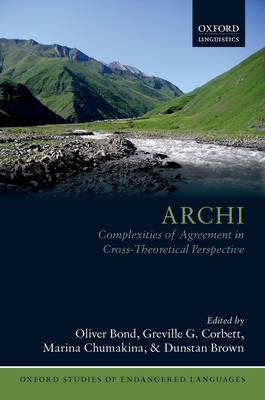
- Afhalen na 1 uur in een winkel met voorraad
- Gratis thuislevering in België vanaf € 30
- Ruim aanbod met 7 miljoen producten
- Afhalen na 1 uur in een winkel met voorraad
- Gratis thuislevering in België vanaf € 30
- Ruim aanbod met 7 miljoen producten
Zoeken
Archi
Complexities of Agreement in Cross-Theoretical Perspective
€ 233,95
+ 467 punten
Omschrijving
This book presents a controlled evaluation of three widely practised syntactic theories on the basis of the extremely complex agreement system of Archi, an endangered Nakh-Daghestanian language. Even straightforward agreement examples are puzzling for syntacticians because agreement involves both redundancy and arbitrariness. Agreement is a significant source of syntactic complexity, exacerbated by the great diversity of its morphological expression. Imagine how the discipline of linguistics would be if expert practitioners of different theories met in a collaborative setting to tackle such challenging agreement data - to test the limits of their models and examine how the predictions of their theories differ given the same linguistic facts. Following an overview of the essentials of Archi grammar and an introduction to the remarkable agreement phenomena found in this language, three distinct accounts of the Archi data examine the tractability and predictive power of major syntactic theories: Head-driven Phrase Structure Grammar, Lexical Functional Grammar, and Minimalism. The final chapter compares the problems encountered and the solutions proposed in the different syntactic analyses and outlines the implications of the challenges that the Archi agreement system poses for linguistic theory.
Specificaties
Betrokkenen
- Uitgeverij:
Inhoud
- Aantal bladzijden:
- 304
- Taal:
- Engels
- Reeks:
Eigenschappen
- Productcode (EAN):
- 9780198747291
- Verschijningsdatum:
- 25/10/2016
- Uitvoering:
- Hardcover
- Formaat:
- Genaaid
- Afmetingen:
- 155 mm x 236 mm
- Gewicht:
- 566 g

Alleen bij Standaard Boekhandel
+ 467 punten op je klantenkaart van Standaard Boekhandel
Beoordelingen
We publiceren alleen reviews die voldoen aan de voorwaarden voor reviews. Bekijk onze voorwaarden voor reviews.







